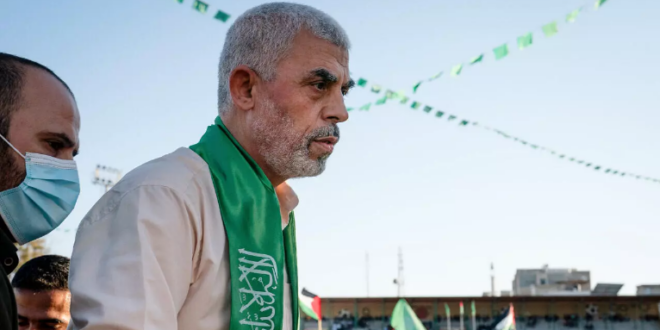Muhamad Yehia
The Palestinian Hamas movement announced on Tuesday the appointment of Yahya Sinwar as head of its political bureau, replacing Ismail Haniyeh, who was killed in an Israeli strike in Tehran on July July 31, 2024. Sinwar’s name rose to prominence with Hamas’s unprecedented attack on October 7, 2023 on Israel. Tel Aviv considers this “living dead man” the architect of the attack, while an Israeli army spokesman described him as the “face of evil” pursued by its forces in Gaza. Sinwar, 61, spent 23 years in Israeli prisons, then assumed security responsibilities within Hamas
According to a statement published by Hamas on Tuesday, Yahya Sinwar is now at the head of its political bureau, replacing Ismail Haniyeh, who was assassinated a week ago in Tehran.
Afterwards, a senior Hamas official stated that Sinwar’s appointment contained a “strong message” to Israel ten months after the war began in the Gaza Strip and that this option was “a strong message to the occupation that Hamas is continuing its path of resistance.”
Since the Hamas attack on Israel, and especially more recently, Sinwar has become a name in the headlines of media outlets around the world. Tel Aviv accuses the Hamas leader in the Gaza Strip of being the architect of the unprecedented attack on the Jewish state, which left 1,200 people dead, while the militants took 240 people hostage.
Sinwar, 61, emerged from Israeli detention to Hamas leadership positions to become Israel’s “living dead man.” Sinwar spent 23 years in Israeli prisons, then assumed security responsibilities within Hamas
Leila Seurat of the Arab Center for Research and Political Studies in Paris says it took maybe a year or two to plan the attack, adding: “This is his strategy, he planned it” before it “surprised everyone” and tried to “change the balance of power on the ground.” The Israel responded with heavy shelling of the Gaza Strip in which tens of thousands of people, mostly civilians, were killed.
For IDF spokesma sin Richard Hecht, Sinwar represents the “face of evil.” He added that he was “a living man Mitt.” Sinwar has not appeared in public since the day of the attack.
In 2017, after his election as the movement’s leader in the Gaza Strip, Agence France-Presse met with Abu Abd al-Allah, a Hamas member who spent a few years with Sinwar in Israeli prisons. Sinwar is known for his discretion, he said, especially as he is a security man “par excellence”.
Sinwar “makes his decisions very calmly, but he is difficult when it comes to defending Hamas’ interests,” he said.
Strangle a collaborator with Israel in the keffiyeh
Yahya Sinwar was born in the Khan Yunis Palestinian refugee camp in the southern Gaza Strip and joined the Hamas movement founded by Sheikh Ahmed Yassin before the first Palestinian intifada in 1987.
Sinwar established the group’s security apparatus in 1988 and is responsible for prosecuting, punishing, and sometimes executing those accused of spying for Israel.
According to the interrogation report he underwent in Israel and published in Hebrew media, Sinwar confessed to being strangled to death by collaborating with the keffiyeh Israel in a cemetery in Khan Yunis.
Sinwar graduated from the Islamic University of the Gaza Strip and learned the Hebrew he speaks at a good level during his 23 years in Israeli prisons. He is said to have a deep understanding of Israeli culture and society.
Sinwar was sentenced to life imprisonment four times for killing two Israeli soldiers. He was among 1,027 Palestinians released in a 2011 deal for the release of French-Israeli soldier Gilad Shalit.
Sinwar later became a senior commander in the Izz al-Din al-Qassam Brigades, Hamas’s military wing, before becoming the movement’s leader in the Strip
“Power for Negotiations”
Sinwar dreams of a single Palestinian state that would combine the Gaza Strip and the West Bank occupied by Israel alongside East Jerusalem since 1967.
According to the Council on Foreign Relations of the United States (think tank), Sinwar vowed to punish anyone who obstructs reconciliation with Fatah.
In 2006, the two groups fought a bloody conflict that led to Fatah’s expulsion from the Gaza Strip and Hamas takeover. Despite a clear rapprochement in relations, reconciliation efforts between all the two Palestinian movements have failed. Surat says Sinwar adopted a path that was “radical in military planning and another pragmatic in politics.” “He is not calling for force for the sake of force, but for negotiations” with Israel.
In 2015, Sinwar’s name was added to the U.S. list of the most wanted “international terrorists,” along with Mohamed Deif, the current commander of the Izz al-Din al-Qassam Brigades and the second mastermind of the October October 7 attack, according to Israel.
 موقع وجه أفريقيا موقع وجه أفريقيا هو موقع مهتم بمتابعة التطورات في القارة الأفريقية
موقع وجه أفريقيا موقع وجه أفريقيا هو موقع مهتم بمتابعة التطورات في القارة الأفريقية



